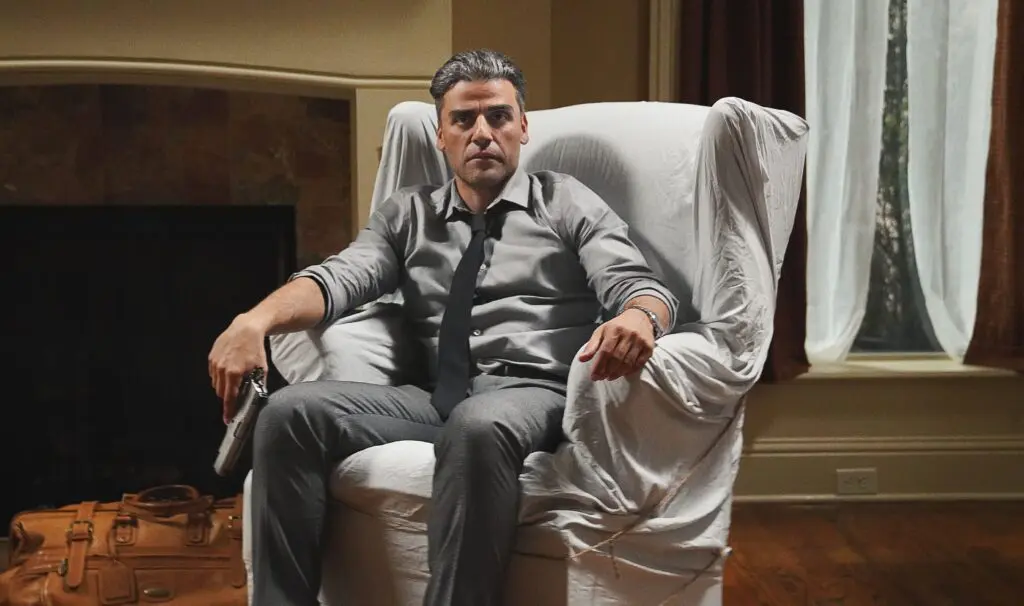Summary
Paul Shrader delivers a tight and involving screenplay that deals you in, then sets you up for a final bluff.
This review of The Card Counter is spoiler-free.
Written and directed by Paul Shrader, The Card Counter is a tale of redemption and revenge set against a backdrop of casinos and card rooms.
Oscar Isaac is William Tell Tillich, a haunted man, with a dangerous past that has used his time spent in jail learning how to count cards. His newly developed skill aids him as he travels the casinos of the USA, playing small games of Blackjack, and using his card counting technique to walk away a winner. Fans of gambling-based scripts will already be familiar with the counters method, the numeric values of cards are recorded mentally by the counter, and when the deck in play looks likely to fall in his favor, the counter ups his bet and maximizes his chances of winning. To avoid detection, although it is often easy to spot, he plays small and wins small, and is allowed to leave the table before management gets hold of him and has him barred. In an Atlantic City casino, Tell gatecrashes a security convention, with Willem Dafoe at the podium explaining his new face recognition software. It seems there is history with these two men, and he, in turn, is recognized by a young man, Cirk Baufort, with a C, who also knows Dafoe, and has revenge of his own planned for the man responsible for the breakdown of his family, and his father’s death. Tell feels for the young man, and asks if he wants to join him on the road with him.
The die is cast at this point, and the film then takes the audience through the world of card counting at casinos, while slowly revealing the dark past that connects the three men.
Schrader knows this type of story well, and it could be argued that he falls back here onto the familiar territory. His previous work includes such iconic films as Raging Bull and Taxi Driver, so the theme of tortured men seeking some form of redemption is obvious in his work.
The Card Counter is a smaller film than previous outings, though. It smacks of indie production, despite the involvement of Martin Scorsese, and everything in the main story feels intimate, the larger backstory that seals the final fate of the characters is much darker and more intense, and the uncomfortable scenes of their past lives give the film a larger landscape.
For me, despite the need for the legacy of the main players to bear down upon them, I was more engaged with the smaller aspects of the film.
Isaac is brilliant and has gravitas in the role as the no-nonsense card counter, Tye Sheridan plays Cirk with just the right amount of attitude to get you on-side without being annoyed by him, Dafoe has a short time spent on screen but delivers what is needed, and Tiffany Haddish who plays La Linda, scouting for poker players to add to her gambling “stable”, adds style and charm, breaking the tension and lending heart to every scene. The small cast plays well, but there are some moments where things look a little stilted; perhaps time was against them, and more takes may have helped. However, things hang together well and the characters are believable and gel well.
As the film moves to its third act, you can feel the darkness closing in. Schrader tries his finest bluff here, letting you think that we are going one way, before dragging you another, and I am sure that there were multiple drafts of the final outcome. I have to admit that personally, I was not a fan of the conclusion. Perhaps I was too invested with the characters, so the ending left me flat, but that is a personal opinion, and no doubt many will agree it was the ending the film deserved.
The Card Counter is still a gem in the current film climate. If you need something else from your cinema visit that isn’t a franchise, a remake, a prequel, or a sequel, then treat yourself and go. After gut-punching duffers like Eternals and Halloween Kills, it’s refreshing to know that there are still films like this, Dune and The French Dispatch, to engage film goers that are ready to engage with smart and intelligent movies on the silver screen.




